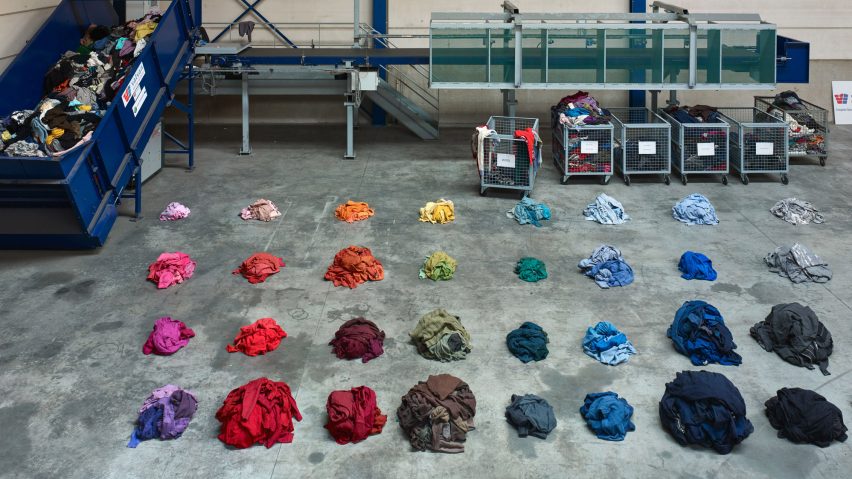Christien Meindertsma: Beyond the Surface, at the Vitra Design Museum in Basel examines the designer's work with wool, flax, incinerator ash and recycled wool.
Video and printed matter demonstrating the Dutch designer's working processes are displayed alongside products made from each material, to best demonstrate Meinderstma's research-based practise.
Meindertsma first came to prominence in 2007 with her project PIG 05049, a three-year research document that showed the entire range of products, from photo paper to chewing gum, that is produced from the body of a pig. "I'm interested in the whole circular life of a product," she told Dezeen.
To reflect the lengthy reports that she produces as part of each project, the Hamburg design firm Studio Besau-Marguerre designed the exhibition to be a "three-dimensional archival publication".
"What we tried to impart with our exhibition design was the way Christien works," said Eva Marguerre. "The exhibition is inspired by her minute approach to research and to documentation."
However, rather than present the designer's work chronologically, along with the curator Viviane Stappmanns, they decided to group the exhibition around the four materials.
"We realised that we would prefer a different format in order to give visitors a sense of the thoroughness that Christien applies to her work, which usually drives her to investigate a material or over long periods of time, producing a number of outcomes, not just a single product," said Stappmanns.
To investigate the ash found at the bottom of incinerators, Meindertsma sorted through large quantities by hand and separated lead, zinc, iron and copper. These were then analysed and melted down.
This work is demonstrated through photography by Mathijs Labadie, Meindertsma's book on the subject, a film made to accompany the book, and fine art prints by Thomas Eyck.
Her work with wool is also illustrated with Labadie's imagery and with film by Roel van Tour, who chronicled the One Sheep Sweater project with "before and after" shots of the 25 sheep whose fleeces were used for the project. A sweater and samples of the wool also form part of the display.
The sweater project aimed to shed light on the stages between the source of a material and its consumer. The designer argues that the closer the relationship between the two, the more we as consumers tend to care for the item.
Meindertsma has found that recycling textiles is not as easy as people think, since recycled garments must all have the same blend of fibres to be re-made into premium materials. She looks at recycled wool to demonstrate this.
Samples of the 1,000 sweaters she examined to determine their exact wool blend, as well as the new fibres she produced sit alongside Irish Donegal Tweed, as well as video documentary of her research process.
In order to study flax, she bought an entire harvest of 10,000 kilograms of the material to experiment by making various products. This project explored the fact that processing and production of flax has moved from northwest Europe to China.
The versatility of the material is demonstrated by a chair made from felted and woven layers of flax, strengthened and combined with a new biodegradable polyester, before being pressed into a mould. It was this chair that initially sparked the exhibition.
"We had first started working with Christien Meindertsma when we bought a prototype of the Flax Chair for the Vitra Design Museum collection in 2016 and invited her for a symposium on new materials," said Stappmanns.
"Then we started to follow her work a little more closely and felt that Christiens approach was so unique that we wanted to give more space to it," she continued.
The exhibition is the designer's first outside her native country and is on display until 20 January 2019 at the Vitra Design Museum Gallery.
Earlier this year, the museum profiled the world's most famous nightclubs, from Manchester's Hacienda, to New York's Studio 54.

